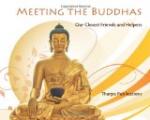Bees and wasps are cousins of the ants. They have four wings, the front pair being the larger. In flight the two wings on each side are hooked together so as to form one broad wing.
We all know how helpful bees are to us. They lay up enough honey to feed themselves through the winter, and we think this a very desirable addition to our own table. The wax they make for their houses is useful to us in more ways than one. But they help us in another way, which is still more curious and interesting. While the bee is burrowing for honey in the heart of some deep blossom, the yellow flower-dust, or pollen, sticks to its hairy body and legs. When it flies to the next flower, some of this dust is brushed off and falls in the right place to make the seeds in that flower grow. So, without knowing it, the bee is helping us in our gardening. Some plants would never bear fruit if the bees did not carry the pollen from one flower to another.
Next to the ants, the bees are the most intelligent insects we know. They make wax houses of beautiful shapeliness, and they rear their little ones with great wisdom and care. There is always a queen bee, and no real princess is more royally tended than are the princess bees. They are fed on different food from that of the other babies, and the royal cradles are of the finest quality. Should all the princesses die, one of the common bees is put into the royal cradle and fed upon the dainty food, and she often makes quite as good a queen as if she were born in the purple.
Bees seldom sting if they are let alone. They are easily frightened by a sudden movement and will try to defend themselves. If a bee alights by mistake on your hand or face, it will soon fly away without hurting you if you can keep quite still. As a rule, they are good-tempered and harmless.
Wasps have not earned for themselves a reputation for good-nature or thrift. They have never learned to store up honey, and every winter many of them freeze to death in their elegant paper houses. It is considered wise not to handle a wasp, lest his feelings, which are easily ruffled, get the better of him. But there is room to admire his good looks, his skill in house-building, and his sturdy pluck and courage.
[Illustration: Paper-makers.]
Wasps do much good in the garden by destroying grubs and caterpillars, and they are quite willing to take their wages in overripe fruit at the end of the season.
A LITTLE BLACK SLAVE.
I am going to tell you about a little slave who lived in France. Her name was Alerta, and she was a tiny black ant.
Not far from Paris there lived a colony of red ants—great lazy fellows who would not work and who would hardly find food for themselves. They thought that a set of slaves would help them very much.
“If we had slaves,” they said, “we should not have to milk our cows or take care of our children.”




